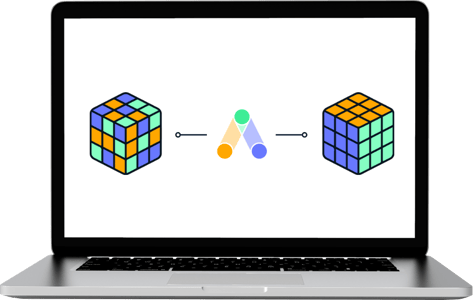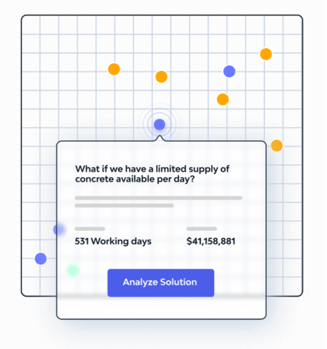The recent attention devoted to AI in the media has sparked conversations with a variety of audiences on how ALICE uses the technology and how our approach differs from products like ChatGPT. In this post, we define some of the fundamental technologies at play and illustrate how generative construction scheduling is distinctive from more mainstream, general use AI solutions.
What is AI?
AI stands for Artificial Intelligence. It refers to the simulation of human intelligence in software that is programmed to think and learn like humans. The goal of AI is to develop systems that can perform tasks that typically require human intelligence – such as visual perception, speech recognition, decision-making, problem-solving, and language understanding – while avoiding common human biases and limitations.
AI encompasses a wide range of techniques and approaches, including machine learning, neural networks, scheduling and planning, natural language processing, computer vision, robotics, and more. These methods allow AI systems to analyze large amounts of data, identify patterns, make inferences and predictions, and adapt their behavior based on experience.
What is generative AI?
According to McKinsey and company, “Generative artificial intelligence (AI) describes algorithms that can be used to create new content, including audio, code, images, text, simulations, and videos.” The primary characteristic of generative AI is its ability to produce original and creative outputs, rather than just recognizing or classifying existing data. This sets it apart from other types of AI, such as discriminative AI, which focuses on categorizing or classifying data.
Does ALICE use generative AI? How is it different than tools like ChatGPT and Google Bard?
ALICE is generative. And it is powered by AI. But ALICE is different than “general use” products like Chat GPT in a number of important ways.
ALICE is generative, creating numerous potential schedules for a construction project based on essential information about that project and its constraints. We refer to this process as generative construction scheduling.
ALICE combines proprietary algorithms with a parametric, rules-based engine that understands construction logic and constraints. The ALICE platform parametrizes project data to automatically generate construction schedules and optimize work sequences based on:
- User-defined rules
- Objectives (e.g. lowest duration or cost)
- Constraints (e.g. resource availability, location)

So how is it different?
ALICE is a purpose-built solution designed to help construction companies and owners develop and explore potential construction schedules for their projects. ChatGPT, in contrast, is a general purpose tool that can be used for everything from crafting a blog post to creating a recipe for guacamole in the style of the King James bible.
ALICE does not use large language models, as ChatGPT does. Rather than using a large, generic data set, ALICE instead creates construction schedules based on the data and constraints (e.g. scope, time and cost) that each ALICE customer enters into the software. ALICE is a parametric solution that applies its algorithms to the parameters it is given to develop scheduling options.
ALICE does not currently use machine learning, as ChatGPT and Google Bard do. We see a variety of ways in which we could integrate machine learning into the ALICE platform and are currently exploring opportunities to apply the technology.
And what is machine learning?
Machine learning is a subset of AI. McKinsey defines the term this way: “Machine learning is a form of artificial intelligence based on algorithms that are trained on data. These algorithms can detect patterns and learn how to make predictions and recommendations by processing data and experiences, rather than by receiving explicit programming instruction. The algorithms also adapt in response to new data and experiences to improve their efficacy over time.”

What is construction optioneering?
The ALICE platform gives its users not only the ability to create a variety of construction schedule options, but also the opportunity to run “what if” analyses and refine the most promising options. Customers might ask questions like “what if I added a second crane?” or “what if I ran my framing crew overtime for a week?” – and then change parameters to understand the impact of these decisions on the schedules they are considering. ALICE calls this process of exploration and experimentation “construction optioneering.”
The media talks about ChatGPT “hallucinating” – simply making things up, seemingly to please its users. What does this mean, and does ALICE have this problem?
ChatGPT, Google Bard, and other AI systems that are based on probabilistic large language models have problems with hallucinations. This occurs when the LLM generates false information.
 “Hallucinations can be deviations from external facts, contextual logic or both. Hallucinations often appear plausible because LLMs are designed to produce fluent, coherent text.
“Hallucinations can be deviations from external facts, contextual logic or both. Hallucinations often appear plausible because LLMs are designed to produce fluent, coherent text.
They occur because LLMs have no understanding of the underlying reality that language describes.”
(image source: Unsplash)
ALICE does not use LLMs, is not probabilistic, and therefore does not hallucinate. In construction, the stakes are high, and there is no room for arbitrary solutions. Users of the ALICE platform can be fully confident in the schedules it produces, as they are bound by the constraints its users enter – as well as the laws of physics. Just as construction professionals have long trusted other parameter-driven solutions, such as Revit, so can they also trust ALICE. LLMs, in contrast, do not effectively account for user constraints. In a world as exacting as construction, their output is not trustworthy.
Can ALICE AI make predictions based on my historical data?
ALICE does not currently make predictions based on past data. Instead, we work with current data about customers’ projects and help them to create optimal schedule solutions based on that information.
Should I worry about my proprietary data being exposed to other firms through AI?
While we cannot speak for other firms, ALICE does not expose a customer’s proprietary data to others in any way. Nor is it used to “train” our AI systems.